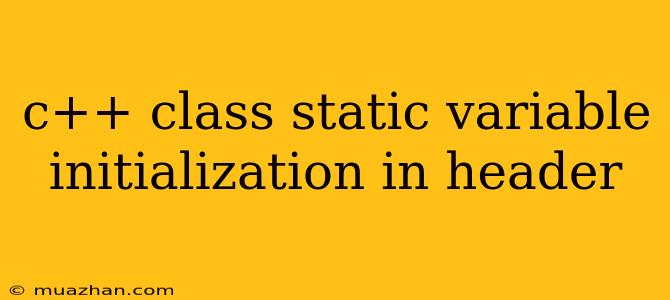C++ Class Static Variable Initialization in Header
Static variables are a powerful tool in C++ that can be used to maintain shared data across multiple instances of a class. When declared within a class, static variables are initialized only once, at the start of the program. However, initializing static variables in the header file can lead to some complexities and issues. Here's a breakdown of the best practices and pitfalls:
Understanding Static Variables in C++
Static variables have these key characteristics:
- Shared across Instances: Every object of the class shares the same static variable. Changes made to a static variable by one object affect all other objects.
- Initialized Once: Static variables are initialized only once, at the start of the program.
- Lifetime: Static variables exist for the entire duration of the program.
Initialization in Header Files: The Problem
Initializing a static variable directly in the header file can cause problems:
- Multiple Definitions: If you include the header file multiple times in your project, you'll have multiple definitions of the static variable, leading to a linker error. This is because the compiler treats each inclusion of the header as a separate unit of code.
Solutions to the Multiple Definition Problem
Here are the common approaches to initialize static variables within header files:
1. Initialization Within the Class Definition
You can initialize the static variable directly within the class definition. This avoids the multiple definitions problem as the compiler knows to treat it as a single definition.
#include
class MyClass {
public:
static int counter;
};
// Initialization within the class definition
int MyClass::counter = 0;
int main() {
MyClass obj1;
MyClass obj2;
obj1.counter++;
std::cout << "Counter after obj1 increment: " << MyClass::counter << std::endl;
obj2.counter++;
std::cout << "Counter after obj2 increment: " << MyClass::counter << std::endl;
return 0;
}
Explanation:
- The declaration
static int counter;inside the class definition creates the variable. - Outside the class,
int MyClass::counter = 0;defines and initializes the static variable.
This method ensures that the initialization happens only once.
2. The const Approach
If the static variable is const (its value will never change), you can initialize it directly in the header file. This method works because const variables are considered compile-time constants and do not have separate definitions.
#include
class MyClass {
public:
static const int MAX_VALUE = 100;
};
int main() {
std::cout << "Max value: " << MyClass::MAX_VALUE << std::endl;
return 0;
}
3. The constexpr Approach
Similar to const, constexpr variables are evaluated at compile time, preventing multiple definition errors.
#include
class MyClass {
public:
static constexpr int MAX_VALUE = 100;
};
int main() {
std::cout << "Max value: " << MyClass::MAX_VALUE << std::endl;
return 0;
}
4. Using a Static Function for Initialization
You can define a static function inside the class to handle the initialization of the static variable. This function is called only once, typically during the first use of the static variable.
#include
class MyClass {
public:
static int getCounter() {
static int counter = 0; // Initialize within the function
return counter;
}
};
int main() {
std::cout << "Counter: " << MyClass::getCounter() << std::endl;
std::cout << "Counter: " << MyClass::getCounter() << std::endl; // No re-initialization
return 0;
}
Explanation:
- The
static int counter = 0;line insidegetCounter()ensures thatcounteris initialized only once, the first time the function is called.
Best Practices
- Prefer initialization within the class definition: This is the most straightforward and generally preferred approach.
- Use
constorconstexprfor compile-time constants: Avoid the risk of multiple definitions for unchanging values. - Use static functions for complex initialization logic: When you need to perform specific actions during initialization, use a static function.
Remember that proper initialization of static variables in header files is crucial to avoid compiler errors and ensure correct program behavior. By following these guidelines, you can effectively manage static variables in your C++ code.
